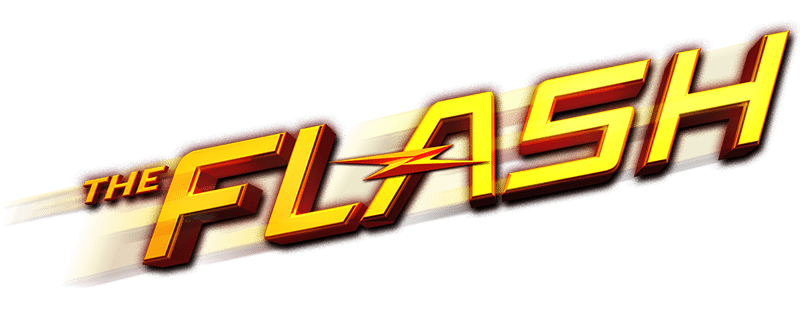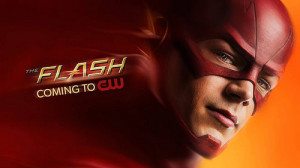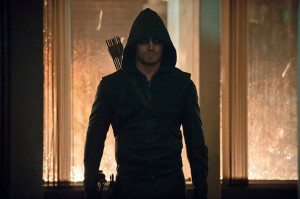The Flash – Pilot Review
The first thing apparent about The Flash is how resolutely ‘superhero’ it is. It doesn’t try too hard to ground itself – grittiness and realism are largely disregarded in favour of unabashed, unbridled enthusiasm for both the source material and the myriad ways in which it could be translated to the small screen. Above all else, The Flash is characterised by an infectious feeling of optimism that goes far to explain why this show would be The CW’s biggest launch since 2009.
Not that this pilot is without missteps. The episode’s early flashback to Barry Allen’s (Grant Gustin) childhood tragedy feels like a necessary box being ticked in the age of the dark and edgy superhero. It’s all a little rudimentary, from the childhood bullying to the death of Barry’s mother, Nora Allen. The injection of pathos feels artificial and unnatural, especially in the context of what follows it.
Thankfully then, we almost immediately return to the present, and our clearest showcase of Barry’s emerging powers. Super speed is an inherently visual superpower, so The Flash will likely live and die by its special effects. With this year’s X-Men: Days of Future Past having arguably the best portrayal of a superpower yet with the similarly speedy Quicksilver, and the same character soon featuring in Avengers: Age of Ultron (played by a different actor – it’s complicated), The Flash is emerging out into a pretty big playing field. Still, it acquits itself admirably, as the joyful exuberance of the show’s approach becomes immediately apparent. The first person perspective shots are particularly fantastic in conveying the frenetic pace – it feels like a videogame, in the best possible way. How The Flash’s television budget will be spread out across the whole season remains a small concern, but for now at least it’s pretty dazzling.
From the offset, there’s a definite sense that this is a show itching to move past the well-covered grounds of an origin story.
Barry’s supporting cast are quickly established, with Barry’s childhood friend Iris West (Candice Patton) immediately filling the role of the love interest. An unfortunate hangover of the CW formula established in the likes of 90210 and One Tree Hill, the romance is immediately problematised by Barry’s earlier introduction in CW’s other comic book adaptation, Arrow. His interest in Arrow’s Felicity Smoak is summarily dropped – presumably because Emily Bett Rickards doesn’t have the time or inclination to star in both shows – leaving Iris’s introduction feeling a little forced. The fact that so many ship Felicity and Arrow’s own protagonist Oliver Queen probably didn’t help either. Danielle Panabaker and Carlos Valdes as Caitlin Snow and Cisco Ramon respectively fall much more naturally into place as the bit players and technical support to Barry’s hero, working under the watchful eyes of Star Lab’s founder Harrison Wells (Tom Cavanagh), a man left both physically disabled and professionally shamed by the same incident that gifted The Flash his powers.
That Allen’s abilities are quickly embraced by the man himself, and revealed to the majority of his supporting cast exposes the faith the show’s writers have in the audience’s acceptance of such a fantastical premise. Suspension of disbelief is taken as a given here. This rapid pace however does leave the show prone to exposition. That Barry has allowed himself to become defined by his mother’s murder is reiterated numerous times, but it’s actually the well-rounded nature of his character that makes him appealing. Gustin plays him bright-eyed and emphatic: Barry is charming and intellectually curious, but compassionate too. The Arrow cameo further foregrounds the superfluous nature of Barry’s childhood backstory as motivation, whilst also acting as a nice bit of fan-service. Becoming a hero isn’t as out of the blue in this universe, having a historical precedent with the existence of The Arrow.
The speech actually given by Oliver in this scene proves painfully on the nose, ‘Watching over your city like a guardian angel, making a difference, saving people… in a flash’, but it does help to establish what makes this show different to the likes of Arrow. This is a purer conception of the superhero; less influenced by the sort of darkness that marked Arrow, at least in its first season, as a poor man’s copy of Christopher Nolan’s Batman Begins. It embraces the wackiness of super heroics with a light-hearted élan; aware of the narrative possibilities it opens up. Super speed, as a dramatic device is smart stuff: capable of providing agency and opportunity, whilst also being able to tap into the other end of the emotional spectrum, allowing characters to regress, and literally runaway from their problems. That it can also play with the metaphysics of space and time is suggested at in the episode’s surprising epilogue.
There are no promises of success here, but first impressions are certainly encouraging in The Flash’s imminently fun pilot. It draws from the same well of wide-eyed wonder and optimism that made Sam Raimi’s first two Spider-Man films such a success, a welcome approach in the wake of more recent, bleaker interpretations.



Comments